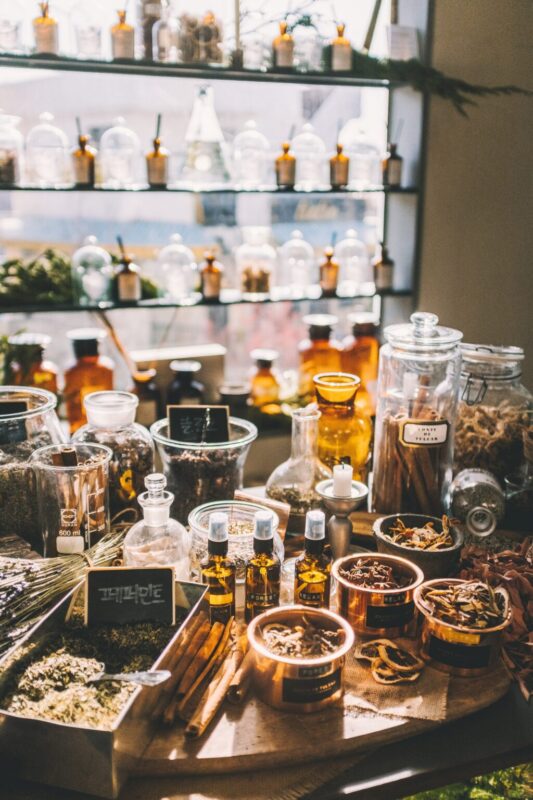What are the most significant differences between natural and synthetic perfume? Is it feasible for both artificial and natural scents to have a distinct personality? Why pick one sort of scent over another? Is one superior or inferior?
Navigating the world of fragrances can be a bewildering experience, especially regarding the ongoing discussion surrounding natural versus synthetic fragrances. Many people hold the misconception that synthetic fragrances are inherently inferior to their natural counterparts.
Page Content
- What is Natural perfume?
- What is Synthetic perfume?
- What are the ingredients used in natural perfumes?
- What are the ingredients used in Synthetic perfumes?
- Biggest differences between synthetic and natural scents.
- Which is better natural or synthetic, fragrance?
- Conclusion
This belief often stems from the notion that anything derived from nature is automatically better and more environmentally sustainable. However, the reality is far more nuanced than this simplified view. It is essential to recognize that natural and synthetic fragrances have merits and considerations. Let us discuss.

What is Natural perfume?
Natural perfume, also known as perfume or pure fragrance, is created solely using natural and plant-based ingredients. Unlike conventional perfumes that often contain synthetic chemicals, natural perfumes use essences, essential oils, and extracts from botanical sources.
Here are some essential things to know about natural perfumes:
- Ingredients: Natural perfumes are crafted using ingredients sourced directly from nature. These can include botanical materials like flowers, fruits, leaves, woods, resins, and spices. The fragrance is extracted from these natural materials such as steam distillation, solvent extraction, or cold methods-pressing.
- No Synthetic Chemicals: Natural perfumes are free from synthetic chemicals such as phthalates, parabens, synthetic musk’s, and artificial colourants. They are formulated with a focus on using ingredients derived from renewable resources and have a minimal environmental impact.
- Aromatherapeutic Benefits: Many natural ingredients used in perfumes have additional aromatherapeutic properties. They can uplift mood, promote relaxation, or provide a sense of well-being beyond just their pleasant scent.
- Unique and Complex Scents: Natural perfumes offer a wide range of scents, from delicate and floral to rich and earthy. They capture nature’s intricate and nuanced aromas, resulting in a more authentic and multi-dimensional fragrance experience.
- Personalised and Artisanal: Natural perfumes are often handcrafted in small batches by perfumers who sincerely appreciate botanical essences. This artisanal approach allows for greater creativity, attention to detail, and the ability to customize the perfumes to suit individual preferences.
- Evolves on the Skin: Natural perfumes interact with an individual’s body chemistry and evolve. They can create a unique and personal scent signature specific to each person, making the fragrance more intimate and personal. It’s important to note that while natural perfumes are generally considered a healthier and more environmentally friendly alternative to synthetic fragrances, they may still cause sensitivities or allergies in some individuals. Performing a patch test or consulting with a professional is advisable if you have specific sensitivities or concerns.

What is Synthetic perfume?
Synthetic perfume, also known as artificial or synthetic fragrance, is a type of fragrance that is created using artificial chemicals in a laboratory. Unlike natural perfumes derived from botanical sources, synthetic perfumes are formulated using synthetic compounds designed to mimic or create different scents.
Here are some essential things to know about synthetic perfumes:
- Ingredients: Synthetic perfumes are chemical compounds not derived directly from natural sources. These compounds are typically created using synthetic or artificial materials like petrochemicals.
- Replication of Scents: Synthetic perfumes aim to replicate the scents found in nature. They can imitate the aroma of flowers, fruits, spices, or other natural elements, but they do not come from those natural sources.
- Consistency and Stability: Synthetic perfumes offer a more consistent and stable scent experience. They are less influenced by external factors like weather conditions or personal body chemistry, and their fragrance remains relatively predictable.
- Wide Range of Scents: Synthetic perfumes provide diverse scent options. They can replicate well-known natural scents, but they also allow for creating unique fragrance compositions that may not exist in nature.
- Cost-Effectiveness: Synthetic perfumes are often more cost-effective than natural perfumes because the synthetic compounds used to create them are generally less expensive than sourcing natural botanical ingredients.
- Safety and Regulation: Synthetic fragrance ingredients are subject to safety regulations and testing to ensure their suitability for use in perfumes. Regulatory bodies in different countries have guidelines to assess synthetic fragrance compounds’ safety.
- It’s important to note that while synthetic perfumes are widely used and enjoyed, some individuals may have sensitivities or allergies to certain synthetic fragrance ingredients. Therefore, it’s always a good idea to test a fragrance on a small skin area or consult a professional if you have specific sensitivities or concerns.

What are the ingredients used in natural perfumes?
Natural perfumes are crafted using ingredients sourced directly from nature. Here are some common ingredients used in natural perfumes:
- Essential Oils: Essential oils are highly concentrated aromatic compounds extracted from various parts of plants, such as flowers, leaves, bark, and seeds. They provide the distinct fragrance of the plant they are derived from. Examples include lavender, rose, jasmine, bergamot, and sandalwood essential oils.
- Absolutes: Absolutes are similar to essential oils but are obtained through solvent extraction instead of steam distillation. This method is used for delicate flowers that do not yield enough oil through distillation. Absolutes are highly aromatic and provide rich and intense scents. Examples include jasmine absolute, rose absolute, and vanilla absolute.
- Extracts: Natural perfume extracts can be derived from various botanical sources. These extracts are obtained by macerating or infusing plant materials in a solvent, such as alcohol or oil, to capture their aromatic properties. Examples include vanilla, coffee, or fruit extracts like strawberry or citrus extracts.
- Resins: Resins are the natural exudates obtained from trees and plants. They are often used as base notes in perfumes, providing warmth, depth, and longevity to the fragrance. Common resin ingredients include frankincense, myrrh, benzoin, and labdanum.
- Tinctures: Tinctures are alcoholic extracts of various botanical materials, such as flowers, leaves, or spices. These extracts capture the plant material’s scent and add complexity and depth to the perfume. Examples include rose tincture, lavender tincture, or clove tincture.
- Carrier Oils: Carrier oils are used as a base to dilute essential oils and other aromatic ingredients. They provide nourishment to the skin and help disperse the fragrance. Common carrier oils used in natural perfumes include jojoba, coconut, sweet almond, and grapeseed.
It’s important to note that the specific ingredients used in natural perfumes can vary depending on the perfumer’s formulation, desired scent profile, and availability of botanical materials. As a result, natural aromas often showcase a combination of these ingredients, carefully blended to create a unique and aromatic fragrance experience.

What are the ingredients used in Synthetic perfumes?
Various chemical compounds are specially manufactured in a laboratory to generate synthetic perfumes. These compounds are designed to replicate the scents found in nature or to create entirely new fragrances. Here are some common ingredients used in synthetic perfumes:
- Aroma Chemicals: These are synthetic compounds developed to mimic the scents of natural elements like flowers, fruits, spices, and more. Aroma chemicals serve as the fundamental building blocks of synthetic perfumes, providing the distinct fragrances associated with them.
- Synthetic Musks: Musk is a popular note in perfumes, and synthetic musks are used to replicate its scent. Synthetic musks offer a range of fragrances, from clean and fresh to rich and sensual. They are designed to imitate the natural musk derived from animals like deer or muskrats.
- Fixatives: Fixatives are synthetic ingredients that enhance the longevity and stability of a perfume’s scent. They help the fragrance molecules adhere to the skin and slow their evaporation. Common fixatives in synthetic perfumes include synthetic musks, synthetic ambergris, and various synthetic resins.
- Solvents: The fragrance compounds are dissolved and diluted using solvents to make them easier to apply. Ethanol (alcohol) is a common solvent used as the carrier for the fragrance, while diethyl phthalate (DEP) helps disperse the scent evenly.
- Synthetic Accords: Artificial accords are created by combining different aroma chemicals to mimic the scents of specific natural ingredients or to develop entirely new fragrance profiles. These accords can replicate the aroma of flowers, fruits, woods, and other elements, allowing perfumers to craft unique and innovative scents.
- Stabilizers and Preservatives: Synthetic perfumes often contain stabilizers and preservatives to maintain the integrity of the fragrance and prevent degradation over time. These compounds help extend the shelf life of the scent, ensuring it remains fresh and stable.
It’s important to understand that synthetic perfumes’ specific ingredients and formulations can vary, as perfumers have their preferences and the industry continuously develops new compounds. These advancements aim to expand the range of available scents and improve the overall performance of synthetic perfumes.

The most significant differences between synthetic and natural scents.
When it comes to fragrances, there are two main types: natural and synthetic. Let’s compare the two:
- Composition: Natural fragrances are acquired from natural sources like flowers, fruits, and leaves. They contain essential oils, absolutes, and extracts from these botanical materials. On the other hand, synthetic fragrances are created in a lab using aromatic chemicals designed to replicate natural scents or create unique ones.
- Scent Variety: Natural fragrances offer a wide range of scents found in nature, such as floral, fruity, herbal, and woody notes. They capture the complexity and richness of natural ingredients. Synthetic fragrances, however, provide a broader range of options since they can mimic natural scents or offer entirely new and imaginative fragrance compositions.
- Consistency and Stability: Natural fragrances can vary in scent due to weather, growing conditions, and extraction methods. They may also have less longevity, requiring reapplication throughout the day. Synthetic fragrances offer greater consistency and stability over time. Their scent remains predictable and is less affected by external factors. They are often formulated to last longer on the skin.
- Allergenic Potential: Some individuals may be sensitive or allergic to specific natural fragrance components, such as essential oils or plant extracts. It’s important to note that natural ingredients can still cause allergic reactions in susceptible individuals. Due to their complex chemical compositions, synthetic fragrances have been associated with a higher risk of skin sensitization and allergic reactions in some people.
- Sustainability and Environmental Impact: The extraction of natural fragrance ingredients can impact the environment, depending on cultivation, harvesting, and processing methods. However, sustainable practices like organic farming and responsible sourcing can help mitigate these effects. Synthetic fragrances require petrochemical extraction and energy-intensive manufacturing processes, contributing to carbon emissions and waste.
- Regulation: Regulations regarding natural and synthetic fragrances vary across regions. Natural fragrance ingredients may be subject to strict rules and sourcing requirements to ensure sustainability and prevent the exploitation of endangered species. Synthetic fragrances undergo safety assessments, but the vast number of chemicals used makes it challenging to evaluate each compound’s potential health and environmental impacts.
Which is better natural or synthetic, fragrance?
Determining whether a natural or synthetic perfume is better is a subjective matter that depends on individual preferences, values, and circumstances. Both types of fragrances have unique qualities to consider. Here’s a breakdown of some factors to help you make your assessment:
- Authenticity and Connection to Nature: Natural perfumes can provide a sense of authenticity and a connection to nature. They capture the scents of natural botanicals, which appeals to those who value these ingredients’ purity and organic origin.
- Scent Variety and Creativity: Synthetic perfumes offer a more comprehensive range of scent options. They can replicate natural scents but also create unique and imaginative fragrance compositions that may not exist in nature. This variety provides greater creative possibilities and the chance to explore different scent profiles.
Final Words
Ultimately, the choice between natural and synthetic perfume is personal, influenced by individual preferences, values, and considerations.
For example, some individuals prefer the authenticity and connection to nature offered by natural fragrances, while others appreciate the variety and creativity of synthetic perfumes.
Therefore, it’s essential to explore both options, consider the above mentioned factors, and choose fragrances that align with your personal choice.

